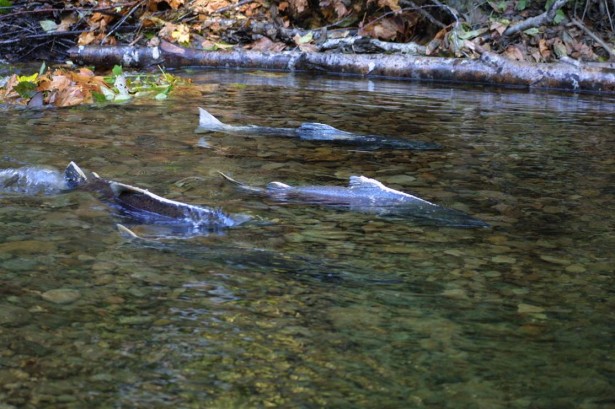
Treaty fishing rights are meaningless if there are no healthy fish populations left to harvest, say Pacific Northwest tribes, fishers and tribal environmental organizations.
But that is exactly what is happening on the Columbia River in Washington State as habitat degradation has led to a decline of salmon and diminished the treaty harvest to levels not seen in nearly 40 years. And a proposal to transport coal through these sensitive waterways threatens to undermine the salmon population even more, tribal leaders say.
Tribal fishers like Billy Frank Jr. fought hard battles to uphold the tribes’ treaty right to fish. When the 1974 Boldt federal court decision established tribal co-management of Washington State fisheries and affirmed the affected tribes’ treaty rights to half the harvestable salmon, their harvest finally increased.
Now the coal industry is seeking to export millions of tons of Wyoming’s Powder River Basin coal to lucrative Asian markets through six proposed shipping terminals on Oregon and Washington waterways. If the coal companies prevail, it will degrade salmon and cultural-foods habitat as well as affect treaty rights, say organizations like the Columbia River Inter-Tribal Fish Commission (CRITFC); the National Wildlife Federation’s (NWF) Tribal Lands Program; tribal nations including the Lummi in northwest Washington and the Yakama in eastern Washington, and tribal voices such as Confederated Tribes of Warm Springs elder Bruce Jim.
Government and big business exploit their water and their land “and [have] forgotten who owns it,” said Jim, a member of the Confederated Tribes’ Fish and Wildlife Committee.
CRITFC voiced multiple concerns about the impacts of these projects in a letter to the U.S. Army Corps of Engineers, the federal agency tasked with oversight.
“The pressures to Basin fish will be substantial,” they wrote.
The projected coal dust coming from increased train traffic will harm Natives’ health, wildlife and food, Jim said. At present, a single rail line transports coal through the Cascade mountain range from Wyoming.
“Our treaty rights to First Foods—salmon, deer, chokecherries, mountain sheep, wild roots, and other resources—are retained by the tribes, and they weren’t given to us by the government,” Jim said. “Moving coal through our land will threaten these rights and our connections to these plants and animals.”
He added that there is no plan in place to reimburse the tribes for the loss of those rights. Moreover, he said, the costs of coal transport outweigh any benefits.
NWF scientists reported concern with increased coastal riparian and marine habitat degradation from port expansions and increased shipping traffic; decreased water quality from coal dust; increased mercury deposits from coal burning and wind-driven transport; increased carbon pollution from coal transport, export, and burning that is driving climate-related extreme weather both nationally and globally, and increased ocean acidification from coal burning.
While specific data isn’t available for Oregon and Washington, the NWF report says that case studies of similar developments elsewhere offer insight into what the Pacific Northwest could suffer: effects of coal dust on mangroves near Cape Town, South Africa; effects of coal combustion on juvenile fish populations in South Carolina; studies of juvenile salmonids and coal dust dispersal in British Columbia, and effects of fly ash dumping on algae off England’s coast.
The coal industry’s proposals are in the environmental-analysis stage.
Read more on treaty rights erosion via environmental degradation.
© 1998 - 2012 Indian Country Today. All Rights Reserved To subscribe or visit go to: http://www.indiancountry.com